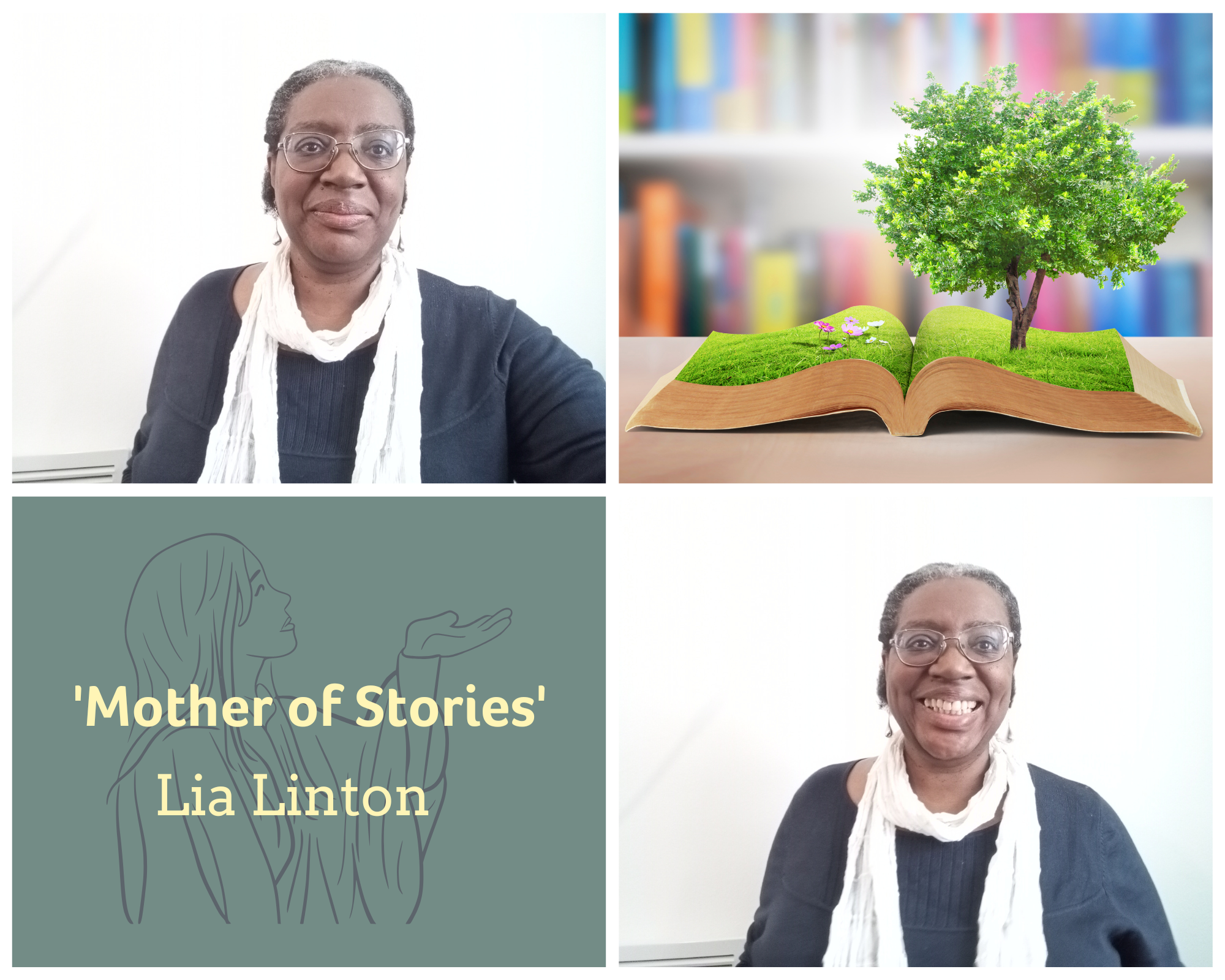Mother of Stories

Published on 25 April 2023 09:21 AM
Mother of Stories: Lia Linton
Tying in with Mental Health Awareness Week, 15 – 21 May, Age UK Islington is running a Poetry Taster Workshop on Tuesday 16 May, 1.30-5pm, hosted by Islington resident, Lia Linton. For more information and to book, click here.
Lia shares her thoughts about the benefits of writing poetry as part of our everyday lives and the role it can play in keeping positive mental health.
Poetry as a means to convey stories has helped with Lia’s own personal transition. Following a personally difficult time, and after a being a carer for 15 years, she went back to poetry. She decided to write a poem every week for a year. “It helped with an emotional transition and gave a voice to my stories, that I hope will have helped others too.”
A coincidence of name
Lia has recently found out that within the African community, a lot of significance is attached to the name that someone is given and its meaning. Being of Afro-Caribbean descent and curious as to what her own name meant, Angelia looked it up and found that in Greek mythology, Angelia is the daughter of Hermes, and the goddess of messages and proclamations.
As Lia writes stories and poetry as well as training booklets, she finds resonance with this. Lia prefers a more modern 'Mother of Stories' title, as this is more than a name to her. It is a mission. She wants to help people shape and share their stories in safe and welcoming spaces. She wants to encourage and support Citizen Poets.
Making poetry accessible to all
“Lots of people say to me that they don’t like poetry. But what they mean is that they feel excluded. Or that they didn’t like poetry, but they like mine because they understood it.
I view poetry as a craft and like all crafts, they are simple tools that can be used as a way of expressing ourselves. I believe that poetry is one of the easiest story forms. It is accessible and personal. No-one needs to hear what you write if you don’t want them to.
Young people use TikTok as a way to create their own content. Poetry Slams, which are live performances of personal poetry, may appeal to young adults. I am in discussions about running a poetry workshop for teens and young adults, to give them building blocks to create their own poems.
Poetry as an “active craft”
One of my friends says that I’m a “Poetry Pusher”! I view poetry as an “Active Craft” and something that can help us to speak and to help build community.
At this point in my life, poetry brings together my passion for creative-writing, the wellbeing work that I’ve done and the training skills that I developed as a management consultant- all into one.
This year, I aim to set up a monthly community writing group. I want to teach the simple forms of poetry and the building blocks. I use lots of different techniques. One is what I call “Collage poetry”. I will gather and print out a set of poems around a theme, e.g. friendship. I will then encourage people to cut them up, to add collaged images from magazines, and use their chosen words and images to create their own poems that express how they feel.
We all have stories to share. Poetry, like other crafts, allows us to access those stories. We are not simply consumers of other people's stories, we are creators. Poetry is not a passive entertainment. It is an active way to engage with others and to contribute to the world.
How stories can be used to redefine ourselves
We also use songs to create prompts to create poetry. Like a Bridge over Troubled Water is a popular choice. I encourage people to choose a topic to lift yourself up and we can use poetry to consciously change our mood. Paying conscious attention to how your mind works can mean that you can reprogramme it over time.
Poetry and positive mental health
Poetry allows you to do something positive. It creates a space where you listen to yourself for yourself in an unfettered way.
It allows you to get something out of your body – what is happening that its hurting, or what is happening that we don’t see on a conscious level.
It allows you to create some distance between your own mental anguish and to change your mood.
Did you find time for poetry when you were a live-in carer?
I became a carer unexpectedly. Emotionally I was not in the best state. I stopped writing and it took some years before I regained my creative self. I also found from a practical point of view, that when I was working and also a live-in carer, I had little time for things like poetry. Yet so much energy comes from creativity. I am a better carer now that I am writing every week. I have more energy to do the work, and more joy in my life.
It is important that we all find time for creative expression. If we are depleted ourselves, we are not filling the well that we draw on when we give to others.
It is important that we find time for creative expression. Social Prescribing Link Workers, including those that work for Age UK Islington whilst being based in GP surgeries, will often ‘prescribe’ creative activities for mental and physical wellness. We have to fill the well we draw on to give to others. We have to replenish our reserves on a regular basis.
Discover the power of poetry for yourself!
To book a place on the Age UK Islington Poetry Taster Workshop on Tuesday 16 May, 1.30-5pm, hosted Lia, and for more information, please click here or call the Age UK Islington Helpline 020 7281 6018.
The Soul Gym
Hear from Lia the background to her work and an extract of one of her poems, "The Cherry Trees Bloom" in this short audio clip (1.5 mins): Lia Linton - The Soul Gym. Lia hosts safe, welcoming spaces for citizen poets to share their stories.
